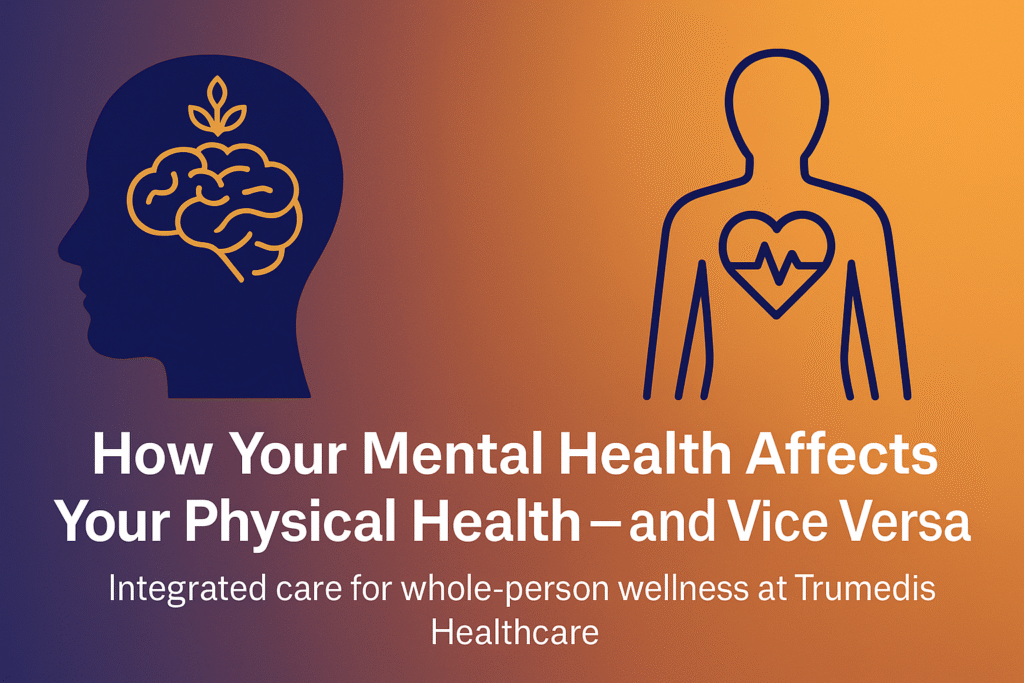How Your Diet Affects Your Mental Health: The Gut-Brain Connection & Nutrients That Support Wellness

When we think about improving our mental health, we often focus on therapy, medication, or stress management. But there’s another powerful tool we often overlook: the food we eat. At Trumedis Healthcare, we emphasize whole-person wellness, and that includes understanding how your daily diet can influence your mood, stress levels, energy, and even your risk of developing mental health conditions like depression or anxiety.
The Gut-Brain Connection: More Than Just Digestion
Your gut and brain are constantly communicating through a complex network known as the gut-brain axis. The gut is home to trillions of bacteria collectively known as the gut microbiome that play an important role in regulating mood and emotional health.
When your gut bacteria are in balance, they help produce neurotransmitters like serotonin (often called the “feel-good” hormone), which directly influence your mental well-being. But when your gut is thrown out of balance by poor nutrition, inflammation, or processed foods, it can lead to symptoms such as anxiety, depression, and brain fog.
Nutrients That Nourish Your Brain and Balance Your Mood
What you put on your plate can directly affect how you feel. Here are key nutrients shown to support a healthy brain and emotional stability:
- Omega-3s help reduce inflammation in the brain and support communication between neurons. They’ve been linked to lower rates of depression and anxiety.
Found in: salmon, tuna, sardines, flaxseeds, chia seeds, walnuts, soybeans - B Vitamins (especially B6, B12, and Folate)
These essential vitamins help your body make neurotransmitters that regulate mood. Deficiencies are often linked to low energy and depressive symptoms.
Found in: leafy greens, beans, lentils, eggs, and whole grains - Vitamin D deficiencies have been associated with mood disorders, especially during winter.
Found in: fatty fish, fortified dairy, egg yolks, and mushrooms (also boosted by sun exposure) - Magnesium helps regulate the body’s stress response, aids in sleep, and reduces anxiety.
Found in: dark leafy greens, nuts (cashews, almonds), bananas, whole grains, and tofu - Fiber supports healthy digestion and stabilizes blood sugar levels, which helps prevent mood swings and irritability.
Found in: fruits, vegetables, whole grains, legumes
Foods That May Harm Your Mental Wellness
While some foods heal, others may harm. Heavily processed foods, refined sugars, and trans fats not only contribute to physical health issues but also to poor mental health.
- Processed foods are often high in sugar and low in nutrients, leading to sugar crashes, mood swings, and fatigue.
- Chronic inflammation often caused by diets high in fried or processed foods has been linked to higher rates of anxiety and depression.
Building Smart Eating Habits for Better Brain Health
- The goal isn’t perfection, but rather consistency. Here are some eating strategies that can support mental clarity and emotional balance:
- Maintain a regular eating schedule. Skipping meals can cause blood sugar crashes, leading to irritability and low energy.
- Add color to your plate. Bright fruits and vegetables are full of antioxidants and nutrients that protect the brain.
Reduce highly processed foods. Instead, opt for whole, nutrient-dense meals that support your body and mind.
Let Trumedis Help You Nourish Your Whole Self
At Trumedis Healthcare, we believe that mental health isn’t just in your head it’s also in your gut, your heart, and your daily habits. Our integrated care model includes both behavioral health and nutrition support, helping you take a comprehensive approach to wellness.
Whether you’re dealing with anxiety, low energy, or just want to improve your mental clarity, we’re here to guide you with personalized, compassionate care.
📞 Ready to take control of your mental health through better nutrition? Contact Trumedis Healthcare today to schedule a consultation with our integrated wellness team.


